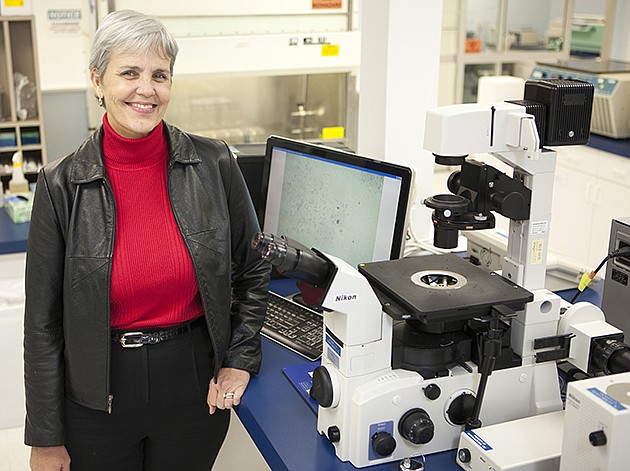Getting its cancer-fighting technology to a place where it could be licensed has always been the goal for Tampa-based Morphogenesis. But along the way, the research and development company has morphed into a services company, and it's even beginning to manufacture.
In 1995, Patricia and Michael Lawman were working as cancer researchers at the Walt Disney Cancer Institute when they decided to start a company. They had no idea the long road for which they were signing up.
Fast forward 19 years, and their 10-person biotechnology company, Morphogenesis, is providing cancer treatment services to cats, dogs and horses, and progressing on a clinical trial for humans. The company has received grants from the National Cancer Institute, the National Heart Lung Blood Institute, the Pediatric Cancer Foundation and Qualifying Therapeutic Discovery Project totaling about $2.3 million. Including private investors and grantors, it has received about $9 million in support. With more than 20 patents and FDA approval for personalized cancer treatments for animals, the company is finally starting to generate revenue.
Morphogenesis focuses on cell and gene therapy, “the epitome of biotech, using the intelligence of the body in fighting cancers,” says Patricia Lawman, CEO of the company. The company finds ways to genetically engineer tumor cells to trigger an immune response from the body.
Slow but steady progress is part of the game for the firm, which spent its first three years writing a business plan, securing patents and winning Small Business Innovation Research grants from the National Institute of Health. Over the years, it has kept costs as low as possible, leveraging partnerships for people, facilities and equipment. Up until 2.5 years ago, the company was working in borrowed facilities from St. Joseph's Children's Hospital in Tampa.
Since inception, the company has spent around $10 million, investing nearly all of the money into its lab. “The amount of money burned is a thimble compared to other folks trying to survive in this field,” according to Morphogenesis's Chief Operating Officer Joseph Scanlan.
Realizing how expensive it would be to dive directly into cancer treatments for humans, the Lawmans decided to first work on pets. In 2010, the company founded Veterinary Oncology Services to provide treatment for more than 20 cancers in more than 60 breeds of dogs, cats and horses. The company doesn't deal directly with treatment of the animal, but it uses a piece of the animal's tumor tissue to create an individualized vaccine. Morphogenesis treated its first cases in May 2012, and now works with vets in California, Colorado, Arizona, Florida, Ohio, Connecticut, New York, Virginia and Texas. The company has delivered more than 1,000 doses.
There are 315 board-certified veterinary oncologists in the U.S., according to Patricia Lawman. Over the last two years, the industry has taken off — people have started to view their pets as family members, and spending $5,000 to $8,000 on chemotherapy or other options to treat cancer is not out of the question, she says. One out of every four dogs and one out of every three cats die of cancer.
People find the Veterinary Oncology Services treatment attractive because there are no side effects from the vaccine. The cost ranges from $4,000 to $8,000, depending on the kind of cancer and number of doses. One of the biggest challenges is finding a way to market to the 20,000 general practice veterinarians who could prescribe the treatment, without undercutting the veterinary oncologists. To this point, most of the company's business has been through pet owners finding it on the Internet.
In September, the company started its first equine clinical trial that allows the DNA plasma vaccine to be injected directly into the tumor, without requiring a tissue sample. The vaccine is called ImmuneFX; it's the “first and only personalized vaccine able to be widely commercialized,” Scanlan says. The vaccine is currently in a clinical trial treating horses with melanoma in Kansas.
Leveraging research from the equine trial, the company is planning to submit its application to the Food and Drug Administration for human use of the vaccine in the next couple weeks. It expects its human clinical trials to begin in the next two to three months.
Although last year Morphogenesis treated 60 cases, it is prepared to ramp up business quickly, with the ability to handle about 1,000 cases with the equipment in place. The company estimates it'll see demand for thousands of cases in the next few years.
Though it declined to share details, Morphogenesis says a lot of things could change in the next two to three months — pending a contract with a big company. “We're just on the verge of a lot of things right now,” Scanlan says. “But big pharma does not move quickly.”
For Patricia Lawman, despite achieving this step, there's still a long road ahead. “We just want to save them all.”






